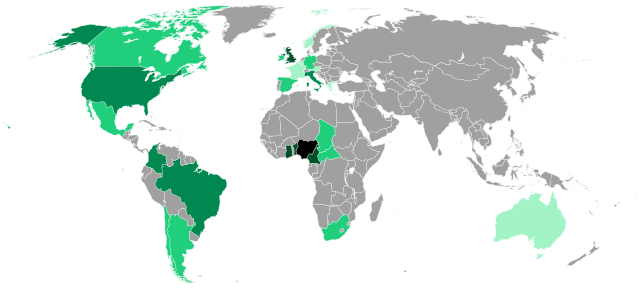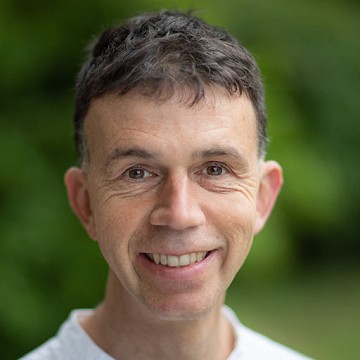“Why are you still in Nigeria?”: Genealogies of Japa movement and future of the Nigerian research ecosystem – Webinar 3: African research and the global science system series
- Kudus Oluwatoyin Adebayo, University of Ibadan
- David Mills, University of Oxford
Event Materials
This event is now archived and we are pleased to provide the following event media and assets, along with the original event overview.
Register here

Map showing the distribution of the Nigerian diaspora in the world
Speaker: Kudus Oluwatoyin Adebayo
Chair: David Mills
This presentation traces the genealogies of Japa movement in Nigeria as an aspect of out-migration with a focus on analysing its contemporary iteration as it shapes academia and the national research ecosystem. While grounded at the intersection of declining expectations/aspirations, youthhood and migration in Nigeria, it situates Nigerian academia within this broader trend. It genealogically traces the propellers of institutional degeneration that produced academic precarity, out-migration and a “cycle of copies of copies” phenomenon. In doing this, it pays attention to the “brain drain” problem sustained by the policies of more developed economies. It also highlights the limitation of this trend of scholarly thought, especially the excessive and relatively unproductive North-South flow narrative at the heart of debate. With a critical autoethnographic reflection on the question “Why are you still in Nigeria?”, I close the discussion unpacking the uncomfortable space of precarity that early career academics in Nigeria occupy and the implications of this discomfort for Japa movement and the future of Nigerian research ecosystem.
About the CGHE webinar series on African research and the global science system
This special CGHE webinar series explores the challenges facing African research in a global science system. Our four speakers bring research-informed perspectives from Ethiopia, Nigeria, Uganda and South Africa, and collectively focus on the intertwined dynamics of political economy, institutional cultures and academic mobility. Drawing on qualitative case studies, narratives and auto-ethnography, they explore the different challenges that Africa’s researchers face whilst training, working and publishing. These include personal narratives of early career researchers (Chiramba), the political economy of knowledge production (Zegeye), academic mobility and migration (Adebayo) and the role of publication requirements in academic careers (Ssentongo).
In many countries, there is a shortage of funding and time for research, and so too for doctoral supervision support. In search of funding and resources, some researchers go ‘outside’ for doctoral study, but this can reinforce academic dependency and a pejorative ‘brain drain’ discourse. The alternative is to survive material discomfort and academic precarity. University research and publishing infrastructures are often neglected, partly because academics are under pressure to prioritise international journals for their work. Drawing on debates from postcolonial theory, the series explores academic pessimism and Africa’s potential research futures.
You need to register individually for each webinar in the series. You can register for the other webinars in the series here.
Event Materials
This event is now archived and we are pleased to provide the following event media and assets, along with the original event overview.
Booking
You will need to register to join this webinar. Please register here

